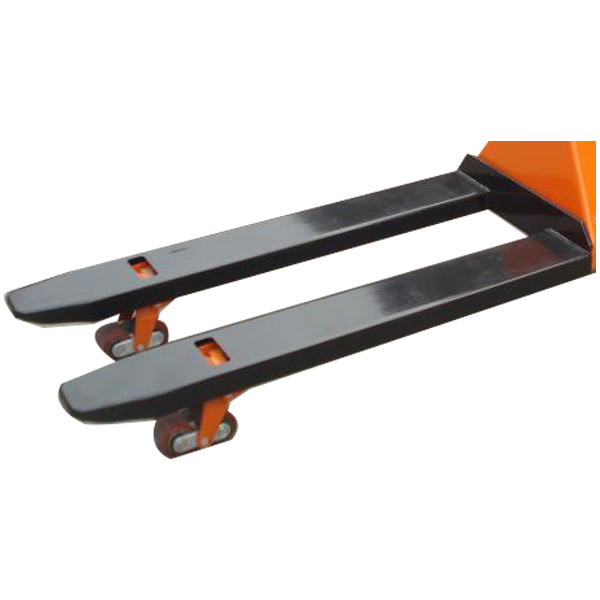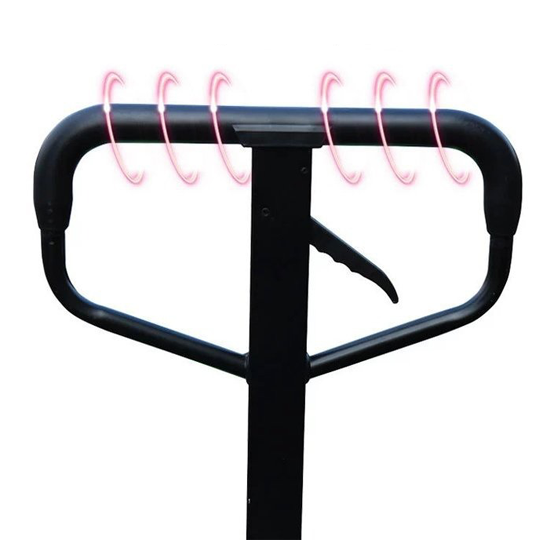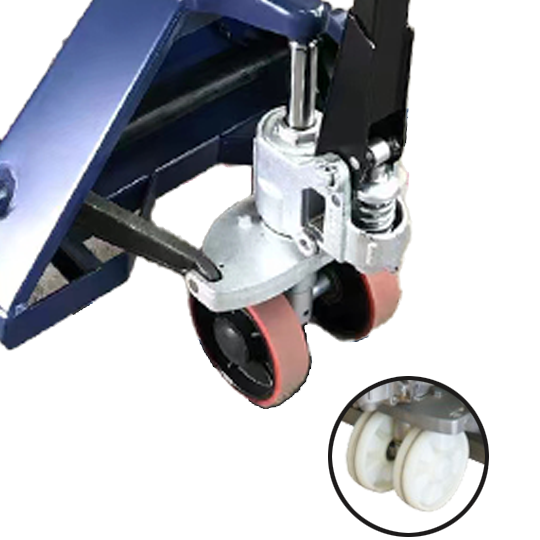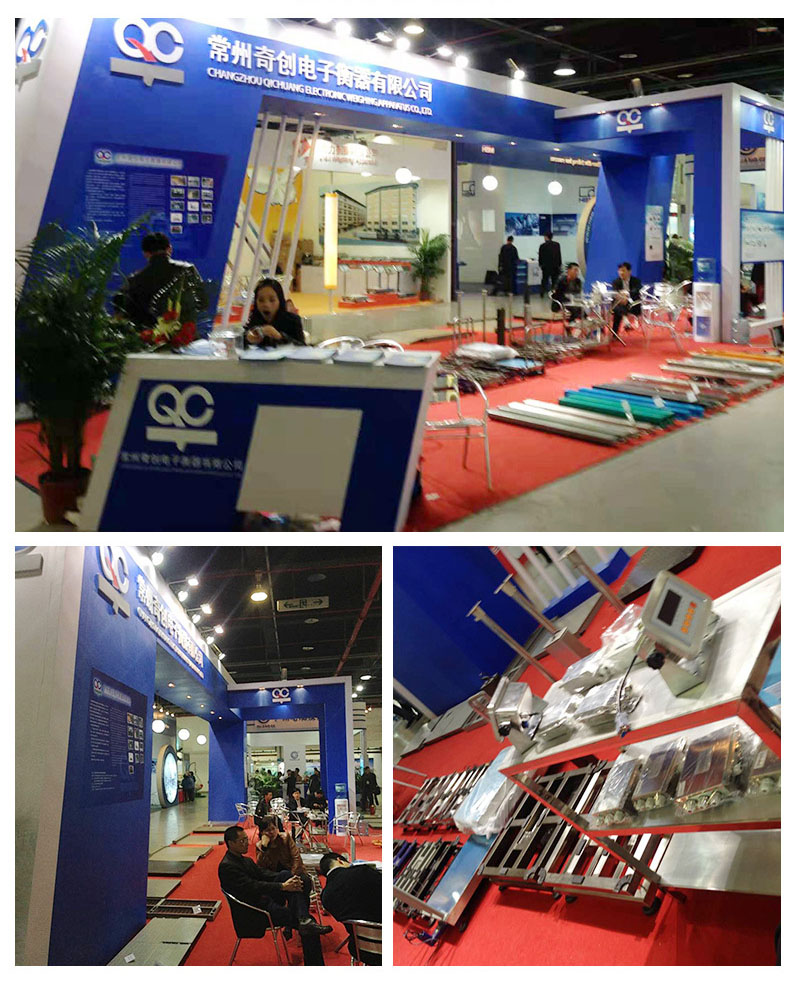Electronic Forklift Scale with Printer
QC Weighing
Carbon Steel
1~3T
1150X560X80~200MM、1150X700X80~200MM
| Availability: | |
|---|---|








Efficiency and accuracy are paramount in the fast-paced world of logistics and warehousing. The electronic forklift scale with printing capability is a revolutionary tool that integrates weighing and documentation into one seamless process. This article explores the features, benefits, and applications of these advanced scales, emphasizing their role in enhancing operational workflows.
An electronic forklift scale is a weighing system integrated into a forklift, allowing operators to weigh loads while lifting and transporting them. Adding a printing function enables immediate documentation of weight data, streamlining processes and improving accuracy.
These scales consist of load cells integrated into the forklift's forks, a digital display for reading weights, and a built-in printer for generating weight tickets or labels. The design ensures durability and precision, suitable for industrial environments.


The two long, horizontal prongs that slide under a pallet.

Used to steer and pump to raise the forks.

Allows the forks to lift the load.

Facilitate movement, usually made of durable materials like nylon or polyurethane.
The primary advantage of a pallet jack scale is its combined functionality. It eliminates the need for separate weighing and transport equipment, saving time and space.
By integrating weighing into the pallet jack, businesses can speed up their processes. This efficiency is particularly beneficial in high-paced environments where time is of the essence.
Using a pallet jack scale can reduce labor costs by minimizing the need for additional handling and weighing steps. This streamlined process allows workers to focus on other critical tasks.

In logistics and warehousing, accurate weight measurements are essential for inventory management and shipping. Pallet jack scales offer a convenient way to weigh pallets on the go, improving productivity and accuracy.
In manufacturing, pallet jack scales can be used to weigh raw materials, components, and finished products. Their mobility and precision make them valuable tools in production environments.
Retail and distribution centers benefit from pallet jack scales for efficient handling and weighing of goods. These scales help ensure accurate order fulfillment and inventory control.
Pallet jack scales come in various capacities, typically ranging from 2,000 to 5,000 pounds. They are designed to provide precise weight measurements, ensuring accuracy in all weighing tasks.
Most pallet jack scales feature digital displays for easy reading of weights. Some models offer advanced features such as tare functions, memory storage, and connectivity options for data integration.
Built to withstand demanding industrial environments, pallet jack scales are made from high-quality materials like steel and reinforced components. This ensures long-lasting performance and reliability.
Fork minimum/maximum height (mm) | 80~200 |
| Fork width (mm) | 560/700 |
| Fork length (mm) | 1150 |
The double-layer structure is sturdy, and any position on the scale platform can be weighed accurately.
Adjustment handles in three positions: rise, fall and move.
It adopts charging and plug-in dual-use methods for selection.
It has the function of automatic correction to ensure accuracy.
The zero point range and anti-vibration software filtering function can be adjusted.
Wheel material: polyurethane, nylon or steel
Body material: carbon steel, surface sandblasted, acrylic paint
Equipped with four alloy steel transducer
LCD liquid automatic backlight function.
It has strong corrosion resistance and is generally used for the transportation of food, chemicals, aquatic products and cleaning items. It can also be used in cold storage and other environments. If special requirements are required, please indicate before ordering.
When selecting a pallet jack scale, consider factors such as capacity, accuracy, durability, and additional features. Assessing your specific needs will help you choose the right model for your operations.
Determine the types of items you need to weigh, the frequency of use, and the environment in which the scale will be used. This will guide you in choosing a scale that meets your requirements.
Research different models and brands to find a pallet jack scale that offers the best combination of features and value. Reading reviews and seeking recommendations can provide valuable insights.
Provide ongoing training and support for operators responsible for using the truck scale. Ensure they understand proper operating procedures, safety protocols, and troubleshooting techniques to address common issues. Regular training sessions can improve efficiency and reduce the risk of operator errors.
Address any issues free and promptly in one year by repairing or replacing damaged or malfunctioning components. This may include replacing load cells, cables, junction boxes, or electronic parts that are no longer functioning properly(except for natural disasters and man-made damage).
Stay updated with the latest software releases and system upgrades for the truck scale. Install software updates provided by the manufacturer to enhance performance, add new features, or address security vulnerabilities. Consider upgrading the scale's system hardware if needed to meet changing operational requirements.
Maintain service agreements with qualified technicians or service providers 24h remote hotline technical assistance to urgent service requests and provide onsite assistance when needed.


A: The main benefit is the combination of weighing and printing capabilities, allowing for efficient and accurate documentation of weights.
A: Consider factors such as capacity, accuracy, durability, and additional features. Assess your specific needs and compare different models and brands.
A: Regular maintenance includes calibration, cleaning, and checking for wear and tear. Follow the manufacturer's guidelines for best results.
A: Yes, many modern scales offer connectivity options like USB or Bluetooth, allowing integration with other systems for data analysis and monitoring.
A: Future trends include integration with IoT, AI and machine learning, eco-friendly designs, and more customization options.
Efficiency and accuracy are paramount in the fast-paced world of logistics and warehousing. The electronic forklift scale with printing capability is a revolutionary tool that integrates weighing and documentation into one seamless process. This article explores the features, benefits, and applications of these advanced scales, emphasizing their role in enhancing operational workflows.
An electronic forklift scale is a weighing system integrated into a forklift, allowing operators to weigh loads while lifting and transporting them. Adding a printing function enables immediate documentation of weight data, streamlining processes and improving accuracy.
These scales consist of load cells integrated into the forklift's forks, a digital display for reading weights, and a built-in printer for generating weight tickets or labels. The design ensures durability and precision, suitable for industrial environments.


The two long, horizontal prongs that slide under a pallet.

Used to steer and pump to raise the forks.

Allows the forks to lift the load.

Facilitate movement, usually made of durable materials like nylon or polyurethane.
The primary advantage of a pallet jack scale is its combined functionality. It eliminates the need for separate weighing and transport equipment, saving time and space.
By integrating weighing into the pallet jack, businesses can speed up their processes. This efficiency is particularly beneficial in high-paced environments where time is of the essence.
Using a pallet jack scale can reduce labor costs by minimizing the need for additional handling and weighing steps. This streamlined process allows workers to focus on other critical tasks.

In logistics and warehousing, accurate weight measurements are essential for inventory management and shipping. Pallet jack scales offer a convenient way to weigh pallets on the go, improving productivity and accuracy.
In manufacturing, pallet jack scales can be used to weigh raw materials, components, and finished products. Their mobility and precision make them valuable tools in production environments.
Retail and distribution centers benefit from pallet jack scales for efficient handling and weighing of goods. These scales help ensure accurate order fulfillment and inventory control.
Pallet jack scales come in various capacities, typically ranging from 2,000 to 5,000 pounds. They are designed to provide precise weight measurements, ensuring accuracy in all weighing tasks.
Most pallet jack scales feature digital displays for easy reading of weights. Some models offer advanced features such as tare functions, memory storage, and connectivity options for data integration.
Built to withstand demanding industrial environments, pallet jack scales are made from high-quality materials like steel and reinforced components. This ensures long-lasting performance and reliability.
Fork minimum/maximum height (mm) | 80~200 |
| Fork width (mm) | 560/700 |
| Fork length (mm) | 1150 |
The double-layer structure is sturdy, and any position on the scale platform can be weighed accurately.
Adjustment handles in three positions: rise, fall and move.
It adopts charging and plug-in dual-use methods for selection.
It has the function of automatic correction to ensure accuracy.
The zero point range and anti-vibration software filtering function can be adjusted.
Wheel material: polyurethane, nylon or steel
Body material: carbon steel, surface sandblasted, acrylic paint
Equipped with four alloy steel transducer
LCD liquid automatic backlight function.
It has strong corrosion resistance and is generally used for the transportation of food, chemicals, aquatic products and cleaning items. It can also be used in cold storage and other environments. If special requirements are required, please indicate before ordering.
When selecting a pallet jack scale, consider factors such as capacity, accuracy, durability, and additional features. Assessing your specific needs will help you choose the right model for your operations.
Determine the types of items you need to weigh, the frequency of use, and the environment in which the scale will be used. This will guide you in choosing a scale that meets your requirements.
Research different models and brands to find a pallet jack scale that offers the best combination of features and value. Reading reviews and seeking recommendations can provide valuable insights.
Provide ongoing training and support for operators responsible for using the truck scale. Ensure they understand proper operating procedures, safety protocols, and troubleshooting techniques to address common issues. Regular training sessions can improve efficiency and reduce the risk of operator errors.
Address any issues free and promptly in one year by repairing or replacing damaged or malfunctioning components. This may include replacing load cells, cables, junction boxes, or electronic parts that are no longer functioning properly(except for natural disasters and man-made damage).
Stay updated with the latest software releases and system upgrades for the truck scale. Install software updates provided by the manufacturer to enhance performance, add new features, or address security vulnerabilities. Consider upgrading the scale's system hardware if needed to meet changing operational requirements.
Maintain service agreements with qualified technicians or service providers 24h remote hotline technical assistance to urgent service requests and provide onsite assistance when needed.


A: The main benefit is the combination of weighing and printing capabilities, allowing for efficient and accurate documentation of weights.
A: Consider factors such as capacity, accuracy, durability, and additional features. Assess your specific needs and compare different models and brands.
A: Regular maintenance includes calibration, cleaning, and checking for wear and tear. Follow the manufacturer's guidelines for best results.
A: Yes, many modern scales offer connectivity options like USB or Bluetooth, allowing integration with other systems for data analysis and monitoring.
A: Future trends include integration with IoT, AI and machine learning, eco-friendly designs, and more customization options.